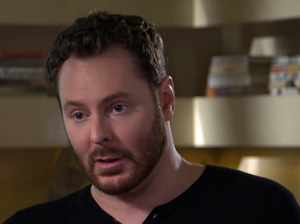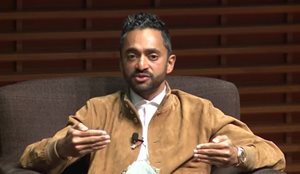Marc Benioff Hitting Out at Silicon Valley's Culture
Early this month, we discussed the Marc-eting effect in Salesforce’s unprecedented growth.  This time, we will discuss Salesforce chairman and CEO Marc Benioff‘s impact on not only Salesforce but also in Silicon Valley.
This time, we will discuss Salesforce chairman and CEO Marc Benioff‘s impact on not only Salesforce but also in Silicon Valley.
Sometimes Mr. Benioff paints himself as a political activist who protests and tweets about the serious real-world issues such as gender equity and the LGBT community’s rights, sometimes he becomes a CEO-as-a-scrappy-showman who publicly gets into a war of words with his other Silicon Valley counterparts. Other times though, we see him as a leader who injects philanthropy into Salesforce's corporate culture.
Speaking at the World Economic Forum in Davos, Switzerland, Silicon Valley billionaire entrepreneur Marc Benioff, who transformed an unexciting cloud computing company into a distinguished brand in a short span of time, discussed issues in Silicon Valley around tech culture, inequality, and discrimination. He criticized the leadership culture of the tech giants in Silicon Valley as well as the government’s lack of involvement and called them out to take more responsibility.
"We basically got to a point where the whole supermajority vote structure thing in Silicon Valley where I'm the entrepreneur and I am in charge no matter what happens, kind of gets blown up," Mr. Benioff said at a panel session titled "In Technology We Trust?” at the World Economic Forum Davos, and added: "The idea (is) that this is somehow acceptable, and it's not.”
To back up his claim on the leaders of tech companies “abdicating their responsibilities,” he brought up Uber’s recent scandals as an example of how they have pursued company growth far beyond investors’ trust capacity, and how they are ignorant of the level of power that they hold over the public. He hit out during the panel while also Uber’s new boss Dara Khosrowshahi was there: “It [Uber] was built for speed at any cost”, which was “unacceptable in a world of connected products”. Khosrowshahi defended the company stating: “When you’re doing four million rides a year, you can’t make up for random events.”
In a follow-up CNBC interview, he explained how to stop the current crisis of trust facing the tech giants. To that point, Mr. Benioff asked the government to step in and regulate social networks just as it does with the tobacco and food industries. As evidence, he pointed out what happened in finance, with CDOs (collateralized debt obligations):
"We are in a new world. A decade ago, you had the banks talking about collateralized debt obligations and credit default swaps, saying they were great for the economy but regulators weren’t paying attention," he said. "The government needs to come in and point true North."
His point was backed by public relations firm WPP founder Martin Sorrell as he said: “The ‘Seven Sisters’—Microsoft, Apple, Facebook, Amazon, Google, Alibaba, and Tencent—had become too big for anyone’s good. On the other hand, Ruth Porat, the finance director of Google parent company Alphabet, defended the company stating that the division of the company into multiple subsidiary companies 'allows us to keep investing and improving the lives of billions of people.'”
It may not be directly related to social media networks but Elon Musk, the CEO of SpaceX and Tesla, expressed his longstanding concerns about the potential danger of artificial intelligence, warning governments at a meeting of U.S. governors this year, saying: “AI is a rare case where we need to be proactive in regulation instead of reactive because if we’re reactive in AI regulation it’s too late.” He believes that by manipulating information such as doing fake news, spoofing email accounts, and doing fake press releases a war can begin. These statements expectedly irked Facebook CEO Mark Zuckerberg as he opposes the spread of fear surrounding the future of artificial intelligence. “AI is going to make our lives better in the future, and doomsday scenarios are "pretty irresponsible," said Zuckerberg in a Facebook Live broadcast.
Tesla, expressed his longstanding concerns about the potential danger of artificial intelligence, warning governments at a meeting of U.S. governors this year, saying: “AI is a rare case where we need to be proactive in regulation instead of reactive because if we’re reactive in AI regulation it’s too late.” He believes that by manipulating information such as doing fake news, spoofing email accounts, and doing fake press releases a war can begin. These statements expectedly irked Facebook CEO Mark Zuckerberg as he opposes the spread of fear surrounding the future of artificial intelligence. “AI is going to make our lives better in the future, and doomsday scenarios are "pretty irresponsible," said Zuckerberg in a Facebook Live broadcast.
Does Technology Really Have Addictive Qualities That Threaten Our Mental Health?
Before diving into concerns about the effect of technology on society and the human mind, to give a little bit of context, here’s the transcript from a relevant part of the CNBC video interview shared above:
Sorkin: How would you regulate a company like Facebook?
Benioff: You'd do it exactly the same way you regulated the cigarette industry. Here's a product, cigarettes. They're addictive. You know, they're not good for you. Maybe there are all kinds of different forces trying to get you to do certain things. There's a lot of parallels.
Sorkin: Is that how you feel about social media?
Benioff: For the most part, yeah.
Sorkin: Meaning, thinking about it as like a cigarette, in that kind of addictive way?
Benioff: I think that for sure technology has addictive qualities that we have to address and that product designers are working to make those products more addictive. We need to reign that back as much as possible.
Mr. Benioff is just the latest in a long line of executives and other elites in the tech industry who have raised concerns about the dangers of technology products and services. Bill Gates and Steve Jobs publicly admitted that they rarely let their kids use the very products they helped develop.
While today, the average age of owning a cell phone is 10, Gates, the former CEO of Microsoft, didn't let his kids get cell phones until they turned 14. Also, in 2007, he implemented a cap on screen time for his daughter due to her unhealthy attachment to a video game.
Steve Jobs, who was the CEO of Apple until his death in 2012, shared in a 2011 New York Times interview with reporter Nick Bilton that he prohibited his kids from using the newly-released iPad: "We limit how much technology our kids use at home."
In an Axios interview, Sean Parker, the first president of Facebook who joined the company in  2004, when it was less than a year old, also publicly raised his concerns about the dangers of social media and how it exploits human "vulnerability:" "God only knows what it's doing to our children's brains." He explicitly explained the intentions behind Facebook’s product development: "The thought process that went into building these applications, Facebook being the first of them ... was all about: 'How do we consume as much of your time and conscious attention as possible?'"
2004, when it was less than a year old, also publicly raised his concerns about the dangers of social media and how it exploits human "vulnerability:" "God only knows what it's doing to our children's brains." He explicitly explained the intentions behind Facebook’s product development: "The thought process that went into building these applications, Facebook being the first of them ... was all about: 'How do we consume as much of your time and conscious attention as possible?'"
"And that means that we need to sort of give you a little dopamine hit every once in a while because someone liked or commented on a photo or a post or whatever," he continued. "And that's going to get you to contribute more content, and that's going to get you ... more likes and comments."
 Chamath Palihapitiya, a former Facebook executive, said in an interview at Stanford's Graduate School of Business: "The short-term, dopamine-driven feedback loops that we have created are destroying how society works. No civil discourse. No cooperation. Misinformation. Mistruth. And it's not an American problem. This is not about Russian ads. This is a global problem. So we are in a really bad state of affairs right now, in my opinion."
Chamath Palihapitiya, a former Facebook executive, said in an interview at Stanford's Graduate School of Business: "The short-term, dopamine-driven feedback loops that we have created are destroying how society works. No civil discourse. No cooperation. Misinformation. Mistruth. And it's not an American problem. This is not about Russian ads. This is a global problem. So we are in a really bad state of affairs right now, in my opinion."
Despite the instincts that people building Facebook had in the early days, Palihapitiya claimed that they, including himself, ignored the possibilities how the platform could be abused not in favor of society: "I feel tremendous guilt," Palihapitiya said. "In the back, deep, deep recesses of our mind, we kind of knew something bad could happen."
Research studies also back all those concerned wealthy Silicon Valley parents as they have found that children who use smartphones for three hours a day or more are much more likely to be suicidal and that frequent social-media use increased the risk of depression by 27% among eighth-graders. Far worse, the teen suicide rate in the US now eclipses the homicide rate, with smartphones as the driving force.
The Marc-eting Effect in the Bay Area
Does Mr. Benioff set a good example? My answer to this question would be somewhere on the ‘Yes’ side of the scale – at least better than many of his counterparts. All these comments and studies cited in the previous heading also are further evidence of souring public sentiment about Silicon Valley that Mr. Benioff tried to draw attention to during Davos.
Even raising his voice about the alarming real-world issues like gender equity, the LGBT community’s rights, or unethical leadership culture of the tech giants in Silicon Valley during the strategic events like Davos is alone a noble thing to do. However, Mr. Benioff doesn’t stop there as he also actually contributes to making necessary changes happen.
As far as cultivating responsible corporate leadership and culture goes, 35% of Salesforce’s employees (nearly 30,000 people) are minorities. Also, in 1999, he started this brilliant 1-1-1 model in which the company donates 1 percent of equity, 1 percent of employee time, and 1 percent of products to non-profits in communities where they operate.
Another example of him choosing the right thing over generating more financial profit happened when he committed to gender equality at his organization after a group of female executives paid a visit to him with some data demonstrating that all women were underpaid compared to their male counterparts at the company. The cost of $3 million the first year, and a subsequent $3 million last year didn’t stop him from taking that initative.
Following the introduction of legislation that discriminated against the LGBT community, He famously tweeted: “Today we are canceling all programs that require our customers/employees to travel to Indiana to face discrimination.” This simple tweet meant a big threat to Indiana’s workforce because two years back, Salesforce acquired Indiana’s biggest tech company called ExactTarget. His tweet was enough to make other executives join. As a result, the legislation was subsequently withdrawn and Indiana quickly passed an amendment to its new religious freedom law explicitly barring anything that would limit anyone’s rights based on their sexual orientation.
He has kept philanthropy as a part of Salesforce’s operating principles since he founded the company in his hometown of San Francisco in 1999. While injecting philanthropy into Salesforce's corporate culture, he doesn’t fail at making the company lucrative for the investors. In fact, he has been a tremendously successful CEO who has reached $10 billion in annual revenue faster than any other enterprise-software counterpart. Mr. Benioff is worth about $5 billion and the company recently announced a huge milestone, becoming the first enterprise cloud software company to break the $10 billion revenue run rate according to results for its fiscal second quarter 2018.
Simultaneously being a successful CEO and socially responsible tech leader, he quite rightfully criticizes the ignorance of other CEOs and entrepreneurs: “I mentor a lot of CEOs and entrepreneurs and when I see that product is the number-one thing, the only thing that matters, that’s a real red flag.”
My POV
First off, even though they make a living by developing and investing in technology, Silicon Valley titans seem to understand the addictive effect of devices and networks, at least more than the public does. However, what they do not grasp or, far worse, choose to ignore is the scope of their responsibilities in shaping the society. Getting caught in impressive figures show their growth in revenue and profit is one thing, ignoring the number of people they affect or hordes of homeless people hanging out a few blocks away from their headquarters due to unaffordable housing rates is another.
Secondly, Mr. Benioff, whose grandfather was acting mayor of San Francisco and an early advocate for BART, is the fourth generation of his family to live in San Francisco. Long an advocate for tech companies giving back to the community, he has become the most influential individual in the Bay Area and the country. He is not only integrating philanthropy into his organization but also pushes other companies to join the movement, and this is where his strong leadership skills come into play. As an example, he proposed that 20 tech companies give at least $500,000 each to a new organization called SF Gives, which aims to fight poverty in the Bay Area.

Venus Tamturk
Venus is the Media Reporter for CMS-Connected, with one of her tasks to write thorough articles by creating the most up-to-date and engaging content using B2B digital marketing. She enjoys increasing brand equity and conversion through the strategic use of social media channels and integrated media marketing plans.